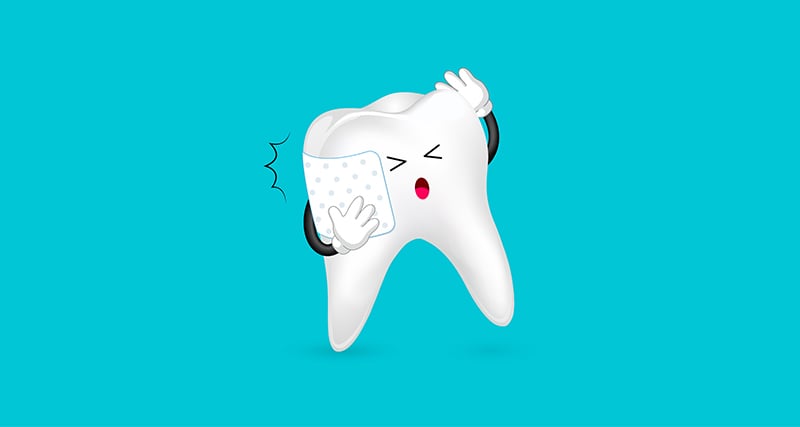What is a toothache?
Toothache is a common issue that everyone struggles with at some point. However, tooth pain does vary in degree when it comes to the level of discomfort and irritation accompanying it. Toothache is known as pain or distress in or around a tooth which can also lead to minor gum irritation. Toothache can also be attributed to many dental issues that require treatment in order to get rid of any tooth pain.¹ Toothache can lead to excruciating pain since the pulp inside your tooth is a soft substance that contains nerves, tissues, and blood vessels. The nerves inside teeth are among your body's most sensitive, leading to significant pain when inflamed or infected with bacteria.¹
Symptoms of toothache
A toothache can be mild, sharp, constant or throbbing. While some people only experience tooth pain when the area infected is touched or pressured, others can struggle with continuous sharp pain. The symptoms depend greatly on the causes of toothache. Some common symptoms, however, are the swelling of the gums around it, foul-tasting drainage from the affected tooth and fever or headache. Nevertheless, if you experience difficulty swallowing or breathing with tooth pain, make sure you visit your dentist.²
Causes of toothache
Tooth decay, cavities or caries are permanently damaged areas in the hard surface of your teeth.
A tooth abscess, which is a bacterial infection inside the centre of the tooth.
Damaged filling: If a dental filling is damaged, the tooth becomes more exposed to decay and infection. In this case, your dentist should replace the filling as soon as possible.
Fractured or broken tooth: This type of fracture involves the whole tooth, from the chewing surface all the way down to the nerve.
Gum disease and inflammation: Gingivitis is usually caused by a bacterial infection and can become a more severe infection known as periodontitis if left untreated.
Tooth eruption or extraction.
Chewing, clenching or grinding teeth in repetitive motion leading to tooth wear.
Toothache treatment and remedies
Tooth pain is difficult to ignore, be it sharp and sudden or continuous yet dull. When the nerve in the root of a tooth or the area surrounding a tooth is irritated, it can result in intolerable toothache and discomfort. Treating toothache depends greatly on identifying the cause and getting the medical care needed for it. For instance, if a cavity is the source of toothache, the dentist will fill the cavity or extract the tooth if necessary. And in case the cause is an infection of the tooth's nerve, a root canal to remove and replace infected pulp may be required.¹
Here are some toothache cases in which you have to seek medical help:²
If the toothache is severe and causes extreme pain.
If swelling in the mouth or face occurs.
If you get a fever or experience pain when opening your mouth wide.
If severe toothache lasts more than two days.
Toothache prevention
Finally, one can help prevent the majority of dental problems by flossing, brushing with fluoride toothpaste, using mouthwash and getting checked by a dentist twice a year. A three-step oral hygiene routine in addition to regular dentist visits can help you avoid many dental problems that can cause tooth decay and toothache. Here are some tips to prevent toothache:³
Follow a three-step routine twice a day for good oral hygiene that includes brushing your teeth for 2 minutes, flossing after meals and using a mouthwash.
Use a daily mouthwash to get rid of hard-to-reach food particles that a toothbrush alone can miss.
Use a toothpaste that contains fluoride, which helps the enamel of the tooth repair itself.
Visit the dentist regularly for checkups and teeth cleaning.
Reduce your consumption of high sugar foods, drinks and artificial sweeteners.
FAQ
Why is toothache worse at night?
Toothaches can be painful during the day, but they can even worsen at night. This could happen as a result of blood rushing to the head when a person is lying down. This extra blood in the area may aggravate the pain and pressure associated with a toothache.⁴
How do I know if my toothache is serious?
Seek medical attention immediately if the toothache is severe and causes extreme pain or if your mouth and face swells as a result of toothache. Also, check with your dentist if toothache lasts more than two days and if you get a high fever or earache.¹
